|  Home Page Home Page
 The Concept of Allah (God) The Concept of Allah (God)
 What is Islam? What is Islam?
 Main Pillars of Islam Main Pillars of Islam
 Muslim World Population Muslim World Population
 The Universal Religion The Universal Religion
 Muhammad (Peace Be Upon Him) Muhammad (Peace Be Upon Him)
 Relevance Relevance
 Women in Islam Women in Islam
 The Concept of Peace and War The Concept of Peace and War
 Tolerance in Islam Tolerance in Islam
 Islam and Cleanliness Islam and Cleanliness
 Other Religions Other Religions
 Islam's contribution to Humanity Islam's contribution to Humanity
 Islam and Knowledge Islam and Knowledge
 Human Rights in Islam Human Rights in Islam
 History History
 sources sources
 Favorite Links Favorite Links
 Photo Album Photo Album
 About Us About Us
-
 - muezzin
- Direction of the Kaaba
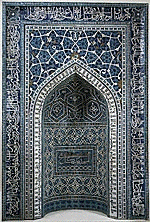 - Mehrab
 - M.Ali Mosque - Cairo
-
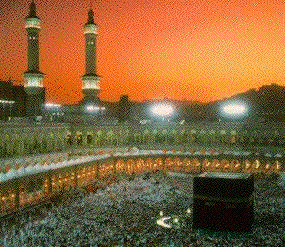 -
- Kaabah by night
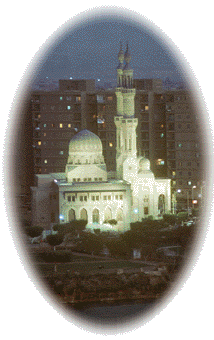 - A modern mosque
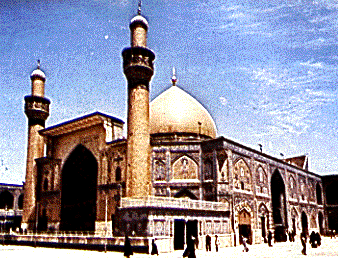 - An old mosque
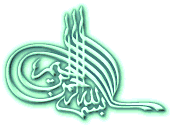 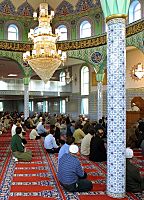 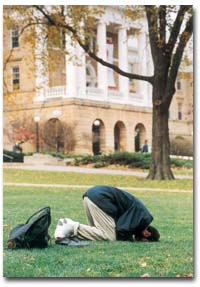  - Prayer to Allah
   - Zakah
 - Dates and Nuts
- for brakefast
 - Ihram (men)
 - Ihram (women)
-
 
| - 1 Declaring Faith (Shahadah)
 - The first pillar of Islam is that a Muslim should believe and declare his faith by saying the (Shahadah):
- There is no God worthy of worship except Allah and Muhammad is his messenger.
- This declaration of faith is called the Shahada, a certain formula which all the faithful pronounce. It contains two parts; the first part refers to God Almighty, the creator of everything, and the second part refers to the messenger, a human being, who received the revelation (through Gabriel) and taught it to mankind.
-
- 2 Prayer (Salah)
- 2-3 Significance of Prayer
-
- Prayer in Islam is considered the main pillar of the religion. Prayer is obligatory and should be performed five times a day.
- There is no hierarchical authority in Islam, and no priests; the prayers are led by any learned person who knows the Qur'an and is chosen by the congregation. These five prayers contain verses from the Qur'an, and are said in Arabic, the language of the revelation, but personal supplications can be offered in one's own language.
- The significance of the Prayer lies in the continuous link to God five times a day, which will help the worshipper avoid misdeeds if he/she performs a sincere prayer
- jump to Submenu - jump to top menu
-
- 2-4 Times of Prayer
-
- Note: Times of prayer differ from place to place depending on the location on the globe.
-
- Dawn (Fajr) 2 units
- From the breaking of the dawn to sunrise.
-
- Noon (Thuhr) 4 units
- After the sun declines from its zenith until it is about midway to setting.
-
- Afternoon (Asr) 4 units
- After the time for Zuhr prayer ends and extending to just before sunset.
-
- Evening (Maghrib) 3 units
- From sunset and extending for a period of an hour and a half.
-
- Night (Isha'a) 4 units
- From about an hour and a half after sunset and extending to midnight or dawn Prayer
- Time of Prayers 5
- jump to Submenu - jump to top menu
-
- 2-5 How to Pray
-
- 1. In order for the worshipper to begin prayers, he/she faces the direction of the Kaaba which is in Makkah, Saudi Arabia, having the intention of the specific prayer.
-
2. The worshipper raises the hands to the ears and pronounces Takbir, or recitation of praise: "Allah is the Greatest." | 
| 
| - 3. During the second step, known as the "standing", he/she recites the chapter of "Al-Fatiha" together with any additional verses from the Qur'an.
- * Praise be to Allah The Cherisher and Sustainer of the Worlds
- * Most Gracious, Most Merciful
- * Master of the Day of Judgment
- * Thee do we worship, And Thine aid we seek.
- * Show us the straight way,
- * The way of those on whom Thou has bestowed Thy Grace
- Those whose (portion) Is not wrath. And who go not astray.
- Before going to the next step, he/she makes Takbir as in step 2.
-
4. With the recitation of another Takbir, the worshipper bows, with his hands on his knees, and in this bent position, praises Allah (God), saying 3 times: "How Great God is." How Great God is. How Great God is | 
| 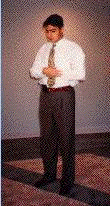
| - 5. The worshipper then resumes the standing position while saying: "May Allah respond to the one who praises him.
-
6. The worshipper then prostrates, with the forehead touching the ground, as a sign of humility and submission to Allah, saying 3 times: "How exalted God is." How exalted God is. How exalted God is. | 
| 
| - 7. The next step involves raising oneself from the prostration while reciting another Takbir, as in step 2, and then remaining in the kneeling position making a brief supplication. Then the worshipper repeats the prostration and stands up returning to the first position. If he/she is in the second unit of prayer ("Rakah"), he/she recites the Tashahud:
-
-
- "All our ways of worship are only for Allah. Peace, mercy and blessing of Allah be on you, O Prophet. May peace be upon us and on the devout slaves of Allah. I testify that there is no God but Allah and I testify that Muhammad is His slave and messenger.
-
- Only this first part of Tashahud is said when the prayer is more than 2 Rakahs (units). The remainder is said in the final Rakah.
-
- "O God send your mercy on Muhammad and his posterity as you sent Your mercy on Abraham and his posterity. You are the Most-Praised, The Most Glorious.
- "O God, send your Blessings on Muhammad and his posterity as you have blessed Abraham and his posterity. You are the Most praised, The Most Glorious.
-
- 8. After finishing the Tashahud, the final steps are also made in the kneeling position. The worshipper turns his/her face to the right saying: "May peace be upon you.
-
9. The worshipper then turns to the left and repeats "May peace be upon you." This greeting, or "salaam" concludes the prayer. However, it must be noted that when additional Rakahs (units) are to be performed, only the first seven steps are repeated, including the Tashahud; then salaam is said only at the end of the prayer. | 
| 
| jump to Submenu - jump to top menu - Other links :
- http://store.ilmquest.org/osc/index.php?cPath=32_43
- http://www.thelightpublishing.com/book.php?id=285
- 3 Poor Due (Zakah)
- The third pillar of Islam is poor-due (Zakah). It is an act of purification through sharing what one has with others. The rationale behind this is that Muslims believe that everything belongs to God, and wealth is held by man as a trust.
-
- The word Zakah itself means purification and growth. Our possessions are purified by setting aside a portion for those in need. Each Muslim calculates his or her own Zakah individually.
-
- For most purposes this involves the payment each year of 2.5% of one's capital, provided that this capital reaches a certain amount of wealth which is not used by its owner. A generous person can pay more than this amount as a voluntary charity (Sadaqah). This amount of money can be provided to bridge the gap between the rich and the poor, and can be used in many useful projects for the welfare of the community. jump to top menu
-
- zakah calculator
- http://www.muslimhands.org/resources/zakatcalc.php
- 4 Fasting (Sowm)
- The fourth pillar of Islam is fasting. Allah prescribes fasting for all able, adult Muslims for the period of the month of Ramadan (the ninth month of the lunar calendar).
- They fast from first light until sundown, abstaining from food, drink, and sexual relations. Those who are sick, elderly, or on a journey, and women who are pregnant or nursing are permitted to break the fast and make up an equal number of days later in the year.
- If they are physically unable to do this, they must feed a needy person for every day missed. Children begin to fast (and to observe the prayers) from puberty, although many start earlier.
-
- Although the fast is beneficial to the health, it is regarded principally as a method of self-purification. By cutting one's self off from worldly comforts, even for a short time, a fasting person gains true sympathy for those who go hungry as well as achieving growth in one's spiritual life.
- jump to top menu
- About Sawm
- http://www.islamic-paths.org/Home/English/Discover/Pillars/Sawm_Main.htm
- 5 Pilgrimage (Hajj)
- The fifth pillar of Islam is making pilgrimage (Hajj) to Makkah, a city in Saudi Arabia. This pillar is obligatory for every Muslim, male or female, once in his/her own life, provided that he/she is physically and financially able to perform it. On this unique occasion, nearly two million Muslims from all over the globe meet one another each year. Regardless of the season of the year, pilgrims wear special clothes: very simple garments,which strip away distinctions of class and culture, so that all stand equal before Allah (God).
The rites of Hajj (pilgrimage) go back to the time of prophet Abraham. They include circling the Ka'bah, and going between the mountains of Safa and Marwah as Hajar (Abraham's wife) did during her search for water. Then the pilgrims stand together on the wide plain of Arafah and join in prayers for God's forgiveness, in what is often thought of as a preview of the Last Judgment. The pilgrimage ends with a festival, called Eid Al-Adha, which is celebrated with prayers and the exchange of gifts in Muslim communities everywhere. - jump to top menu
- Other links about Pillars of Islam
- http://www.faizani.com/articles/five_pillar_of_islam.html
http://www.aswatalislam.net/ - Declaring Faith | Prayer (Salah) | Poor Due (Zakah) | Fasting (Sowm) | Pilgrimage (Hajj)
|
![]()

